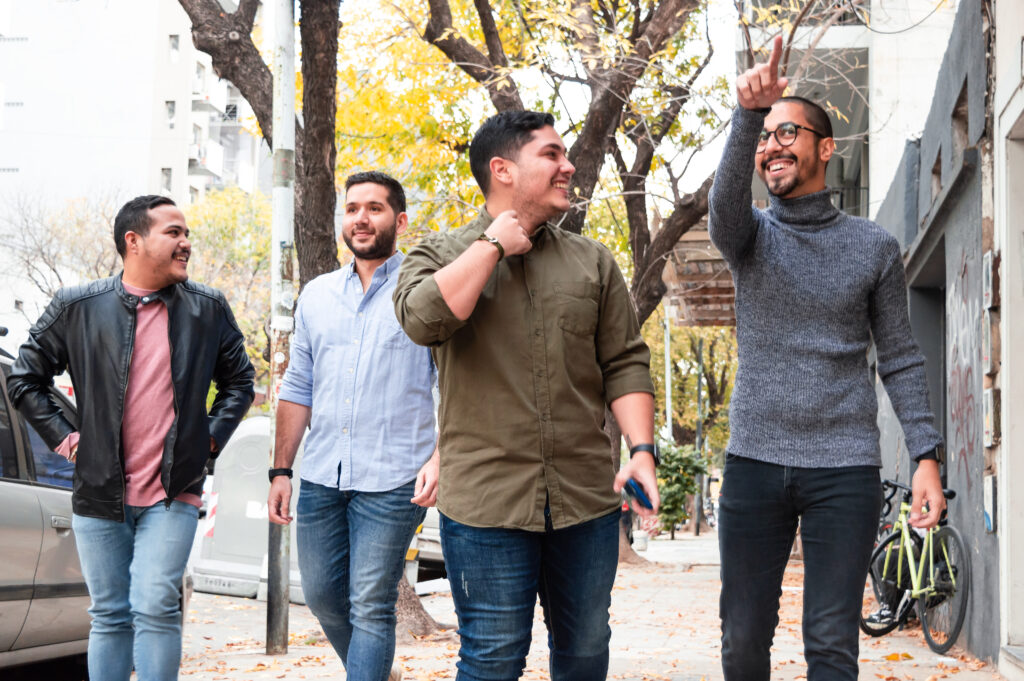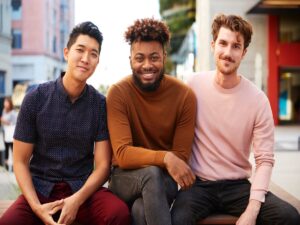The Rules for Gay Couples in Open Relationships – Traditional societal norms have prescribed that monogamy is the only acceptable type of romantic relationship. However, in recent decades, the LGBTQ+ community has been at the forefront of challenging these norms and investigating alternative relationship structures.
What does “open relationship” mean for gay couples? In relationship terms, an open relationship is a non-monogamous relationship in which both partners can pursue romantic and sexual relationships with others. Arrangements can range from casual hookups to more significant relationships with other partners. Even though they may be taboo in some circles, research shows that open relationships can be a healthy, consensual choice for some relationships if both partners are conscious of their decisions and consent to each other having outside relationships.
As an LGBTQ+ couple, if you and your partner are in a monogamous relationship, you may want to know if non-monogamy might be right for you. Perhaps you’re already in an open relationship and want to know how to improve it. At gaycouplestherapy.com, we can help you navigate the complexities of open relationships for gay couples.
I will discuss the various kinds of open relationships, some pros and cons of opening a relationship, and share some insights and advice from gay couples with firsthand experience.

Gay Couples In Open Relationships
Is an open relationship right for you?
Who is a good fit to consider being in an open relationship as a gay couple?
Some partners may prefer non-monogamy to conventional monogamous relationships for several reasons. Non-monogamy may be preferred for some partners because they value the freedom and diversity it may provide. Other partners might be interested in exploring their sexuality or attempting new things their primary partner isn’t open to. Other partners may discover that non-monogamy strengthens their relationship with their primary partner by allowing them to explore their needs and desires while maintaining a solid emotional connection with their primary partner.
Open relationships, like any other form of relationship, have potential drawbacks. For some individuals, jealousy and insecurity can be significant issues, and navigating the complexities of multiple relationships can be challenging. However, many people find that the benefits of non-monogamy outweigh the challenges as long as both partners share open and honest communication, define boundaries, and are willing to work through problems as they emerge.
If you’re thinking about expanding your relationship, what do you need to be mindful of?
Begin with a solid base
Before even considering expanding your relationship, ensure your primary relationship is strong and healthy. Partners ready to consider opening their relations already have established open and honest communication, mutual trust and respect, and a joint grasp of what they want from the relationship. If your primary relationship is already in trouble, opening up your relationship by adding more partners to the mix will unlikely solve the issue and may likely worsen it.
Communicate freely and truthfully
Communication is essential in any relationship, but it is particularly so in non-monogamous ones. You and your partner must be able to discuss your emotions, needs, and boundaries openly and honestly. In a healthy dynamic, partners are willing to listen to one another without passing judgment and be able to express one’s wants and desires without fear of rejection or anger.
Set firm limits
In non-monogamous relationships, it is critical to establish clear limits. You and your partner must agree on what is and isn’t appropriate regarding outside relationships. Agreements may include rules regarding safer sex, how much time you can spend with other partners, and whether you can develop romantic emotions for other people. Ensure you’re both comfortable with your boundaries and willing to revisit them if required.
Brace for envy
Jealousy is a natural human feeling that frequently occurs in non-monogamous relationships. Jealousy does not always indicate that your relationship is in trouble. It’s natural to feel jealous when your partner is with someone else, but how you deal with those feelings is what counts. Be straightforward and honest.
Develop your communication skills
Communication is essential in any relationship but crucial in non-monogamous relationships, as previously stated. Practicing good communication skills such as active listening and empathy and being open and honest about your emotions is critical. Check in with your partner(s) regularly and be willing to change your strategy if things aren’t going well.
Proceed at your pace
Opening up your relationship is a big move; you should go at your own pace. Some couples may begin with casual hookups, whereas others may immediately enter into committed relationships with other partners. There is no right or wrong method, so feel free to adhere to any specific timeline or approach that fits your situation.
Respect your partners and their emotions
Just because you’re in an open relationship doesn’t mean you can take your partners for granted or that you don’t have limits or restrictions. Respect your partners’ feelings and needs and approach them with kindness and compassion. For other partners you may see, just because they may not be your primary partner doesn’t mean that their feelings don’t count.

Be honest with yourself
Be truthful about why you want to be in an open partnership. For example, is it because you genuinely enjoy non-monogamy and believe it’s the best match for you, or because you’re scared of losing your partner and believe opening up your relationship will help keep them around? Some people with an abandonment schema open their relationship because they are so afraid to be alone, even though the dynamic they form may increase their odds of being abandoned. Be aware of your schemas to know whether the desire comes from a healthy place to help you make the best choice for yourself and your relationship.
While open relationships can be an excellent choice for some gay couples, they are not for everyone. If you’re considering expanding your relationship, ensure you and your partner(s) are on the same page and ready to speak openly and honestly about your needs and boundaries. Non-monogamy can be a rewarding and fulfilling way to approach relationships with the right approach and a willingness to work through challenges as they emerge.
Navigating open relationships, regardless of sexual orientation, can be difficult for couples. However, because of societal stigmas and misconceptions about non-monogamous relationships within the LGBTQ+ community, the experience for gay couples can be particularly complicated. Couples therapy can provide a safe, nonjudgmental environment for gay couples to examine their desires and work through any issues that may emerge in an open relationship.
Couples counseling at gaycouplestherapy.com first and foremost can help establish clear communication between partners in an open relationship. Communication is essential in any healthy relationship but crucial in an open relationship with multiple partners. Couples therapy can provide a safe environment for partners to communicate their desires, needs, concerns, and fears about being in an open relationship. In addition, our expert therapist can help partners discuss relationship limits, rules, and expectations, which can help avoid misunderstandings and influence all parties to feel at ease and respected.
Addressing jealousy or insecurities in an open relationship is another essential aspect of couples therapy. Jealousy is a familiar feeling in any relationship, but it is prevalent in open relationships where partners are afraid of losing each other to other partners. Couples therapy at gaycouplestherapy.com can help partners explore the source of their jealousy and develop coping methods that address their emotions. Our therapist can also help partners identify any underlying insecurities or schemas that may add to jealousy, such as low self-esteem or prior relationship traumas. Couples can strengthen their relationship’s foundation of confidence and mutual respect by addressing these problems.
Couples therapy using schema therapy, emotionally focused therapy, and Gottman Method Couples Therapy at gaycoupestherapy.com can help partners navigate the practical elements of an open relationship and address emotional concerns. For example, our therapist can help partners discuss and negotiate safer sex practices with other partners. They can also help partners with scheduling and balancing time between numerous partners. Couples can decrease stress and potential conflicts in their partnership by addressing these practical concerns.
Couples counseling at gaycouplestherapy.com can also give partners a safe place to examine their sexual desires and fantasies. Partners in an open relationship may have different tastes, desires, and sexual needs. Our therapist can help partners communicate their desires and negotiate sexual exploration limits. Partners can also decide how to meet their sexual needs within the framework of an open relationship. Couples can strengthen their intimacy and connection by facilitating these talks.
Couples therapy at gaycouplestherapy.com can help partners navigate any external challenges in an open relationship. For example, societal stigma and misconceptions about non-monogamy can pose difficulties for gay partners in open relationships. Our therapist can guide partners as they develop coping strategies to face judgment or discrimination from family, peers, or society. Partners can also develop tools and get support to deal with feelings of shame or guilt about their desires.
Our therapists understand that solutions in couples therapy do not involve a one-size-fits-all answer for every couple. Each partner in a love relationship creates their own culture, and our therapists help partners honor and respect the creation and development of a culture that is right for them. Some partners may discover an open relationship is not for them, which is fine. Even if partners decide to stay monogamous, couples therapy can still provide a secure and supportive environment for them to explore their desires and emotions. Furthermore, not all therapists have been trained or have expertise working with LGBTQ+ couples or open relationships. Partners need to find a therapist who understands and supports their relationship structure.
Navigating open relationships can be a complicated experience for gay couples. Couples therapy at gaycouplestherapy.com can provide a secure and supportive environment for partners to examine their desires, emotions, and practical concerns. Couples can strengthen their confidence, intimacy, and connection by communicating, addressing jealousy and insecurities, exploring sexual desires, and navigating external challenges.








